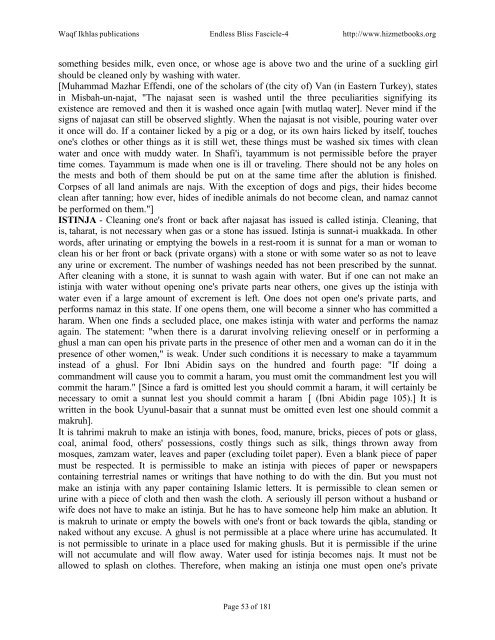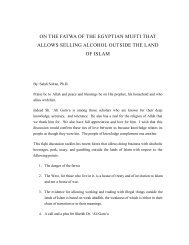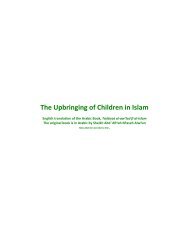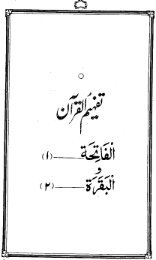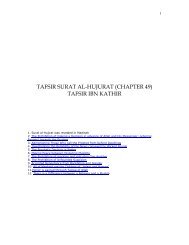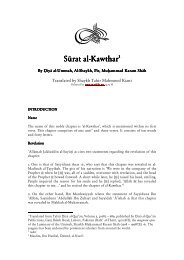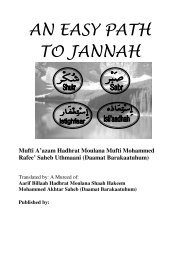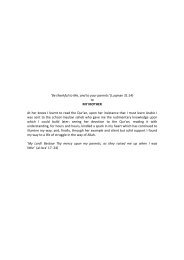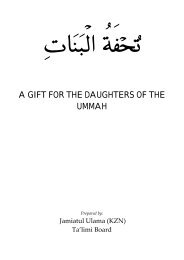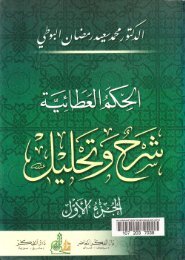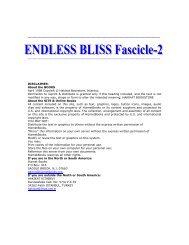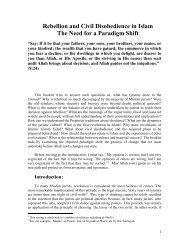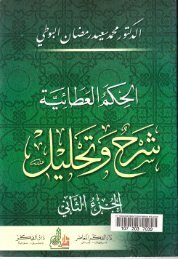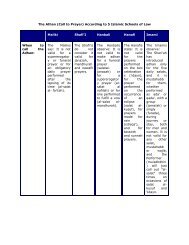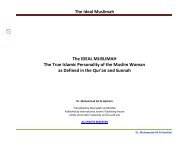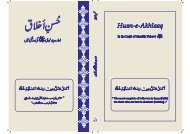ENDLESS BLISS FASCICLE-4
ENDLESS BLISS FASCICLE-4
ENDLESS BLISS FASCICLE-4
You also want an ePaper? Increase the reach of your titles
YUMPU automatically turns print PDFs into web optimized ePapers that Google loves.
Waqf Ikhlas publications Endless Bliss Fascicle-4 http://www.hizmetbooks.org<br />
something besides milk, even once, or whose age is above two and the urine of a suckling girl<br />
should be cleaned only by washing with water.<br />
[Muhammad Mazhar Effendi, one of the scholars of (the city of) Van (in Eastern Turkey), states<br />
in Misbah-un-najat, "The najasat seen is washed until the three peculiarities signifying its<br />
existence are removed and then it is washed once again [with mutlaq water]. Never mind if the<br />
signs of najasat can still be observed slightly. When the najasat is not visible, pouring water over<br />
it once will do. If a container licked by a pig or a dog, or its own hairs licked by itself, touches<br />
one's clothes or other things as it is still wet, these things must be washed six times with clean<br />
water and once with muddy water. In Shafi'i, tayammum is not permissible before the prayer<br />
time comes. Tayammum is made when one is ill or traveling. There should not be any holes on<br />
the mests and both of them should be put on at the same time after the ablution is finished.<br />
Corpses of all land animals are najs. With the exception of dogs and pigs, their hides become<br />
clean after tanning; how ever, hides of inedible animals do not become clean, and namaz cannot<br />
be performed on them."]<br />
ISTINJA - Cleaning one's front or back after najasat has issued is called istinja. Cleaning, that<br />
is, taharat, is not necessary when gas or a stone has issued. Istinja is sunnat-i muakkada. In other<br />
words, after urinating or emptying the bowels in a rest-room it is sunnat for a man or woman to<br />
clean his or her front or back (private organs) with a stone or with some water so as not to leave<br />
any urine or excrement. The number of washings needed has not been prescribed by the sunnat.<br />
After cleaning with a stone, it is sunnat to wash again with water. But if one can not make an<br />
istinja with water without opening one's private parts near others, one gives up the istinja with<br />
water even if a large amount of excrement is left. One does not open one's private parts, and<br />
performs namaz in this state. If one opens them, one will become a sinner who has committed a<br />
haram. When one finds a secluded place, one makes istinja with water and performs the namaz<br />
again. The statement: "when there is a darurat involving relieving oneself or in performing a<br />
ghusl a man can open his private parts in the presence of other men and a woman can do it in the<br />
presence of other women," is weak. Under such conditions it is necessary to make a tayammum<br />
instead of a ghusl. For Ibni Abidin says on the hundred and fourth page: "If doing a<br />
commandment will cause you to commit a haram, you must omit the commandment lest you will<br />
commit the haram." [Since a fard is omitted lest you should commit a haram, it will certainly be<br />
necessary to omit a sunnat lest you should commit a haram [ (Ibni Abidin page 105).] It is<br />
written in the book Uyunul-basair that a sunnat must be omitted even lest one should commit a<br />
makruh].<br />
It is tahrimi makruh to make an istinja with bones, food, manure, bricks, pieces of pots or glass,<br />
coal, animal food, others' possessions, costly things such as silk, things thrown away from<br />
mosques, zamzam water, leaves and paper (excluding toilet paper). Even a blank piece of paper<br />
must be respected. It is permissible to make an istinja with pieces of paper or newspapers<br />
containing terrestrial names or writings that have nothing to do with the din. But you must not<br />
make an istinja with any paper containing Islamic letters. It is permissible to clean semen or<br />
urine with a piece of cloth and then wash the cloth. A seriously ill person without a husband or<br />
wife does not have to make an istinja. But he has to have someone help him make an ablution. It<br />
is makruh to urinate or empty the bowels with one's front or back towards the qibla, standing or<br />
naked without any excuse. A ghusl is not permissible at a place where urine has accumulated. It<br />
is not permissible to urinate in a place used for making ghusls. But it is permissible if the urine<br />
will not accumulate and will flow away. Water used for istinja becomes najs. It must not be<br />
allowed to splash on clothes. Therefore, when making an istinja one must open one's private<br />
Page 53 of 181


